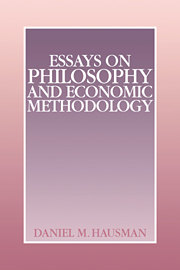Book contents
- Frontmatter
- Contents
- Introduction: What is philosophy of economics?
- PART I METHODOLOGY AND THEORY APPRAISAL
- 1 Economic methodology in a nutshell
- 2 On the conceptual structure of neoclassical economics – a philosopher's view
- 3 John Stuart Mill's philosophy of economics
- 4 The deductive method
- 5 Why look under the hood?
- 6 An appraisal of Popperian methodology
- 7 Is falsificationism unpractised or unpractisable?
- 8 The limits of economic science
- PART II CAUSALITY IN ECONOMICS
- PART III CASES AND PUZZLES
- PART IV POSTSCRIPTS
- Bibliography of relevant writings by Daniel M. Hausman
- Bibliography of works by other authors
- Index
5 - Why look under the hood?
Published online by Cambridge University Press: 05 June 2012
- Frontmatter
- Contents
- Introduction: What is philosophy of economics?
- PART I METHODOLOGY AND THEORY APPRAISAL
- 1 Economic methodology in a nutshell
- 2 On the conceptual structure of neoclassical economics – a philosopher's view
- 3 John Stuart Mill's philosophy of economics
- 4 The deductive method
- 5 Why look under the hood?
- 6 An appraisal of Popperian methodology
- 7 Is falsificationism unpractised or unpractisable?
- 8 The limits of economic science
- PART II CAUSALITY IN ECONOMICS
- PART III CASES AND PUZZLES
- PART IV POSTSCRIPTS
- Bibliography of relevant writings by Daniel M. Hausman
- Bibliography of works by other authors
- Index
Summary
Methodologists have had few kind words for Milton Friedman's “The Methodology of Positive Economics” (1953c) yet its influence persists. Why? One answer is that methodologists have missed an important argument, which economists have found persuasive. Unlike Hirsch and de Marchi (1990), I am concerned here with the argument, not with “what Friedman really meant.”
Friedman declares, “The ultimate goal of a positive science is the development of a “theory” or “hypothesis” that yields valid and meaningful (i.e., not truistic) predictions about phenomena not yet observed” (p. 7). This is the central thesis of instrumentalism. But from a standard instrumentalist perspective, in which all the observable consequences of a theory are significant, it is impossible to defend Friedman's central claim that the realism of assumptions is irrelevant to the assessment of a scientific theory. For the assumptions of economics are testable, and a standard instrumentalist would not dismiss apparent disconfirmations. Indeed, the distinction between assumptions and implications is superficial. The survey results reported by Richard Lester and others, which Friedman finds irrelevant and wrong-headed (pp. 15, 31f), are as much predictions of neoclassical theory as are claims about market phenomena.
But, like Lawrence Boland (1979), I contend that Friedman is not a standard instrumentalist. Consider the following passages:
Viewed as a body of substantive hypotheses, theory is to be judged by its predictive power for the class of phenomena which it is intended to “explain.”
(pp. 8–9)- Type
- Chapter
- Information
- Essays on Philosophy and Economic Methodology , pp. 70 - 73Publisher: Cambridge University PressPrint publication year: 1992
- 6
- Cited by



